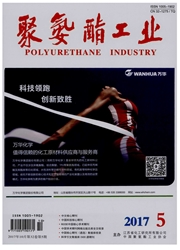

 中文摘要:
中文摘要:
以辛基和聚丙二醇链(聚合度为3)接枝的聚乙烯亚胺的CO2加合物(C8-bPEI—CO,和PPG-bPEI-CO2)为发泡剂制备聚氨酯硬泡,研究其发泡性能,并和以HFC-365mfc(1,1,1,3,3.五氟丁烷)为发泡剂制备的泡沫的性能进行比较。结果表明,两种CO2加合物固体粉末发泡剂的发泡效率高,和相同质量的HFC-365mfc发泡效果相当。在泡孔均匀性和压缩强度方面,PPG—bPEI—CO,与HFC-365mfc几乎没有差别,C8-bPEI-CO2的泡沫稍差一些。CO,加合物为发泡剂的泡沫导热系数稍高,不过在尺寸稳定性和吸水率上可以和HFC-365mfc发泡的泡沫相当,甚至更好。降低导热系数将是以后研究的重点。
 英文摘要:
英文摘要:
The CO2 adducts of hydrophobically modified polyethyleneimines( R-bPEI-CO2) could release CO2 to blow polyurethanes during the exotherrnic polymerization. These CO2 releasing blowing agents were climate- friendly. In this study, two CO2 adducts with either octyl ( i.e. R = C8 ) or poly ( propylene glycol ) ( i.e. R = PPG, whose polymerization degree was 3) side chains were used to blow polyurethanes. The properties of the resultant foams were compared with those blown by HFC-365mfc( CH3CF2CH2CF3 ). The three blowing agents were compara- ble in decreasing the foam density at the same dosage by weight. The foams blown by PPG-bPEI-CO2 and HFC- 365mfe were similar in compressive strength and pore homogeneity, both being superior to those of the foams blown by G8-bPEI-CO2. The foams from both CO2 adduets possessed similar dimensional stability and lower water uptake, compared with the foams from HFC-365nffe. However, the thermal conductivity of the foams blown by CO2 adducts was higher than that of the foarns blown by HFC-365mfc. Future works should focus on how to lower the thermal conductivity of these climate-friendly foams.
 同期刊论文项目
同期刊论文项目
 同项目期刊论文
同项目期刊论文
 A family of polypropylene glycol-grafted polyethyleneimines reversibly absorb and release carbon dio
A family of polypropylene glycol-grafted polyethyleneimines reversibly absorb and release carbon dio 期刊信息
期刊信息
